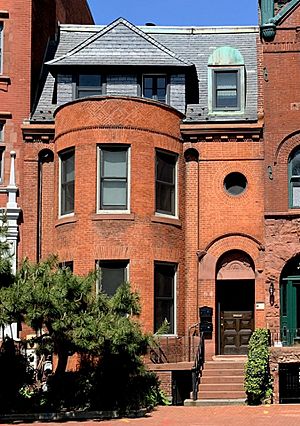Marjorie McKenzie Lawson facts for kids
Marjorie McKenzie Lawson (1912–2002) was an important African American lawyer and judge. She worked on many federal projects. Lawson focused on real estate law, helping with urban renewal projects. These projects aimed to improve city areas. She also worked as the civil rights director for John F. Kennedy's presidential campaign in 1960. She helped connect Kennedy with Black community leaders and advised him on his plans.
In 1962, President Kennedy made her an associate judge for the Juvenile Court of the District of Columbia. This made her the first Black woman judge in the District. Later, in 1965, she became the U.S. representative to the United Nations Economic and Social Council.
Contents
Early Life and Education
Marjorie Alice McKenzie was born in Pittsburgh, Pennsylvania, in 1912. Her parents were T. Wallace McKenzie and Gertrude Stiver McKenzie.
She went to the University of Michigan. There, she earned a bachelor's degree in 1933 and a master's degree in social work in 1934. After college, McKenzie moved to Washington, D.C. She attended the Terrell Law School, which was a historically Black law school. She graduated from there in 1939.
Later, she decided to get another law degree from Columbia Law School. She wanted to make sure her legal skills were beyond doubt. She graduated from Columbia Law School in 1950.
Working with Belford Lawson Jr.
Marjorie met her husband, Belford Lawson Jr., while studying at Terrell Law School. He was one of her teachers. They got married in 1939. Throughout their careers, they worked together on many important civil rights cases.
They had one son, Belford V. Lawson III. He also became a lawyer. From 1938 to 1958, the Lawsons lived in a house at 8 Logan Circle NW in Washington, D.C. Their home is now part of Washington D.C.'s African American Heritage Trail.
Career Highlights
Lawson's career covered many areas of civil rights law. She focused on real estate law and helping to develop housing projects. These projects were often supported by the government and helped African American residents.
In 1939, Lawson was chosen as the assistant secretary of the National Bar Association. From 1942 to 1945, she worked as the Assistant Director of the Division of Review and Analysis for the Fair Employment Practice Committee. This committee worked to prevent job discrimination.
During the 1950s, she was the main lawyer for the National Council of Negro Women. From 1941 to 1955, Lawson wrote a weekly column for the Pittsburgh Courier newspaper. In her column, she wrote about federal policies that affected African Americans.
Lawson met John F. Kennedy around 1957. Her husband was asked to help Kennedy's team connect with the Black community in Boston. Belford suggested Marjorie would be perfect for the job. She then represented Kennedy at meetings for Black religious, political, and women's groups.
In 1960, she became the civil rights director for Kennedy's presidential campaign. She helped him connect with important Black leaders. She also advised him on his policy plans.
In 1962, President Kennedy appointed Lawson as an associate judge on the Juvenile Court of the District of Columbia. This was a very important step, as she became the first Black woman judge in the District. She was also the first Black woman appointed by a president to a judicial position. That same year, Lawson was also appointed to the President's Committee on Equal Employment Opportunity. This committee investigated complaints about discrimination in jobs.
In 1965, she left the Juvenile Court. President Lyndon B. Johnson appointed her as the vice chairman of the President's Commission on Crime in the District of Columbia. A few months later, in September 1965, Johnson appointed her as the United States representative to the United Nations Economic and Social Council.
After her work with the UN, Lawson continued to help with urban renewal. She cofounded the Model Inner City Community Organization. This group worked to build public housing. She continued her real estate law practice until the mid-1990s.
Later Life and Death
Marjorie McKenzie Lawson passed away at her home in Bethesda, Maryland, on October 11, 2002.


